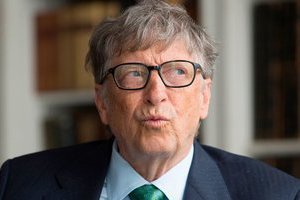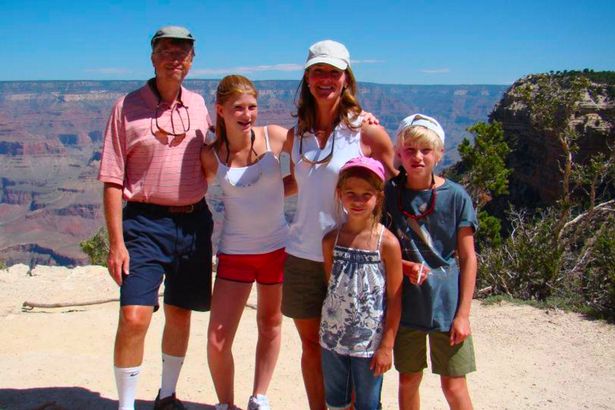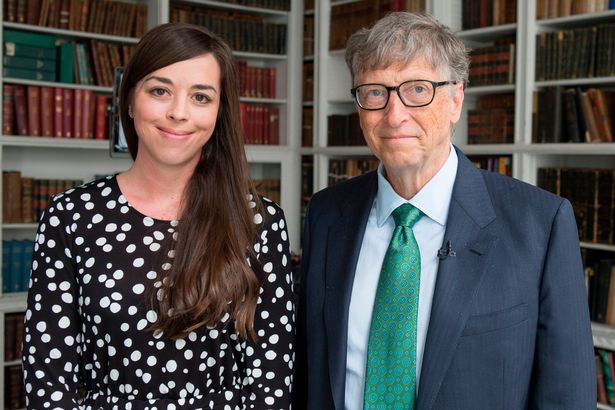Bill Gates limits his children's use of technology
As you wrestle the tablets from your square-eyed kids for the 10th time today, it might be reassuring to hear the king of Silicon Valley shares your worries.
 Bill Gates is the legendary founder of the world’s largest software firm, Microsoft – a company that made him the richest man in the world. But even one of humanity’s greatest technological innovators still banned his kids from having mobiles until they were 14, forbids them at the dinner table and limits his youngest’s screen time before she goes to bed.
Bill Gates is the legendary founder of the world’s largest software firm, Microsoft – a company that made him the richest man in the world. But even one of humanity’s greatest technological innovators still banned his kids from having mobiles until they were 14, forbids them at the dinner table and limits his youngest’s screen time before she goes to bed.
Father to Jennifer, 20, Rory, 17, and Phoebe, 14, he admits: “We often set a time after which there is no screen time and in their case that helps them get to sleep at a reasonable hour. “You’re always looking at how it can be used in a great way – homework and staying in touch with friends – and also where it has gotten to excess. “We don’t have cellphones at the table when we are having a meal, we didn’t give our kids cellphones until they were 14 and they complained other kids got them earlier.”
Just which phones they got is not clear – possibly not those designed by his long-time rival, the late Apple founder Steve Jobs? But Gates’ no-nonsense approach should not be a surprise. He is famous for it. There may be £67billion to his name but there’s nothing excessive or showy about the man in the flesh. Wearing an £8 Casio watch and assuring me that he had a “very nice curry last night”, the 61-year-old adds: “I’m big on pretty mainstream American hamburgers, McDonald’s, Burger King.”

This is a man who, as a child growing up with his lawyer father and philanthropist mother in Seattle, Washington, read an entire collection of encyclopedias and was even sent to see a psychologist because he spent so much time in solitary contemplation. Somehow, there is not the enormous sparkle you would expect from a man making such an awe-inspiring difference to our world.
After dropping out of Harvard to found Microsoft with Paul Allen in 1975, he transformed personal computing. And after setting up the Bill and Melinda Gates Foundation in 2000 with his wife of 13 years, he has given billions to fund worldwide aid. The move has inspired other billionaires, like Facebook founder Mark Zuckerberg, to do their bit.
After quitting as Microsoft chairman in 2014, he dedicated himself to the Foundation and is arguably the greatest philanthropist ever – yet small in stature and unassuming. But no frills is probably what the UK needs this week. His two-day visit has come as Theresa May deliberates her snap election manifesto – one many fear may leave blank any pledge to keep to our target of spending 0.7% of GDP on foreign aid. Gates travels to the poorest countries searching for solutions to their issues. Vaccines, in particular, are a passion.
“We are hoping this will be the last year any child gets polio,” he says. “Because of the UK’s investment in the Global Polio Eradication Initiative, 1.6 million people who would have been paralysed by polio are living normal lives.” Safeguarding against potential global epidemics, including bio-terrorism, is another theme.
In opposition to whispers of aid cutbacks here – and in America under President Trump – he is optimistic about the progress aid is making and why it is necessary for us all. “In 1930, only three out of 10 people could read. Today, more than eight in 10 are literate,” he says. “As recently as 1950, three-quarters of the world was still living in extreme poverty. Today, that number is less than 10%. In 1990, one in 10 children died before five, almost entirely of preventable causes. Today, that number is lower than one in 20.”
Gates adds: “The truth is, investing in the health and wellbeing of people in a poor country pays dividends far beyond that country’s borders. The UK’s foreign aid investments are long-term investments in the health and security of British citizens here at home. It concerns me some world leaders are misinterpreting recent events as reasons to turn inward.”

His charisma is clearly there in his words, if not his demeanour. And his greatest passion of all is for children. “If I could pick just one number that highlights the effectiveness of development aid, it would be 122 million. That’s the number of children’s lives saved since 1990,” he says. Gates will join teens from deprived areas in a Big Debate event in London, partnered by Comic Relief, to consider the success of foreign aid. “Every child has massive potential,” he says.
It is only natural, then, that the man who puts every child in the world first often refers to his own brood. The only downside to his success and profile, he admits, is when it hits quality time with them. He says they, and his wife, are key to his happiness, not his wealth. “Having money doesn’t give you all the answers,” he shrugs.
Download SafeUM — communicate privately, without advertising and spam.
Axarhöfði 14,
110 Reykjavik, Iceland

















